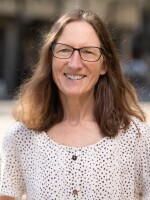All over Oregon, words that haven't been said out loud for generations are being spoken again. The work to revitalize native languages has accelerated in recent years, and scholars hope their efforts will yield generations of new speakers.
[sounds of Chinuk Wawa class]
Jerome Viles teaches Chinuk Wawa at Lane Community College in Eugene. The language has been offered there for 12 years.
Viles: “Like other native American languages, use really declined in the 20th century for many reasons, primarily assimilationist and genocidal policies such as boarding schools, termination, relocation.”
Chinuk stayed alive at the reservations because, as a trading language, it helped diverse people communicate, particularly at Grande Ronde. It's now taught there at the elementary level, and there's even an app [sound of Chinuk Wawa app].

Many Oregon languages, though, completely disappeared. I meet Esther Stutzman at a family restaurant in Cottage Grove. Her mother was Kalapuya, a group that lived all over the Willamette Valley. For decades, Stutzman wanted to revive the language. It had no living speakers. In the early 1990's, she met resistance.
Stutzman: “We were even told by linguists, and teachers, professors that we shouldn't bother because the language is dead.”
People used to say native languages were extinct, but now they're referred to as 'sleeping.' There's plenty of recorded knowledge, but a lot of it is dozing in basement archives. Stutzman and her colleagues found some historic documents, but it wasn't enough:

Stutzman: “Luckily we ran into a man who's been collecting Kalapuya words and putting together a dictionary for the past seven or eight years. And that was our inspiration, that was our start.”
Now Stutzman has a group of people learning the basics. And at a summer camp, they teach what they know to 50 or 75 kids at a time:
Stutzman: “It literally gives you chills. To see these young people using these words in everyday life.”
Jaeci Hall is taking actual baby steps with her native language.
Hall: “There are families, there's like a network of families across the United States that are trying to raise speakers of their language.”
[baby sounds]
Hall is a PhD linguistics student at the University of Oregon who's learning the tenses and semantics of Nuu-Wee-Ya and passing it on to her 8-month old. Nuu-Wee-Ya was spoken on the southern Oregon coast and up the Rogue River. There's no one left who knew the language from childhood:
Hall: “To be able to speak it we gotta look back at these old materials and take out the codes or the patterns.”

She says they have journals and they also have stories:
Hall: “And stories are really a key even if, some of them are audio some of them are written, because it puts the structures down for me to analyze.”
Esther Stutzman says one reason to learn an old language is its connection to the place it was spoken:
Stutzman: “We believe that languages are the breath of life and the breath of identity, and the more [of] your own language you can speak, the more it connects you with the land and your ancestors.”
Hall takes it one step further:
Hall: “The more that we help uncover our culture and let it live, it helps heal all of those horrible things that happened.”

Jerome Viles says the current resurgence may be because enough time has passed since the languages were systematically stifled:
Viles: “As maybe some of the pressures of colonization or oppression are lifting somewhat for people, they're able to turn to that and realize this is a real source of strength. At one point every generation had less speakers of the language and now that's not true. If that can continue, I think the future's really bright.”
Everyone I spoke with stressed that bringing dialects back doesn't only benefit indigenous people. Viles says his students are about half non-native. Shannon Forsberg takes the class. She says the idea came from her writing teacher...
Forsberg: “... who really encouraged everyone in our class to appreciate languages more, and he mentioned that this one is endangered, and I thought it would be something I'd be more interested in than Spanish.”
Stutzman says they want to serve native people first, but...
Stutzman: “We are interested in teaching the language to all people. I don't think it can be just us, who's going to carry this on.”
Stutzman's Kalapuya research struggles to find funding. As awareness grows, they may have some help. The United Nations has declared 2019 the Year of Indigenous Languages.






